
In a year in which political power has changed hands on both sides of the Atlantic, QE Politics students had the chance to find out more about elections on a visit to Westminster.
 Twenty sixth-formers headed to London for a tour of the Palace of Westminster, also enjoying an interactive workshop on elections run by the UK Parliament’s education department.
Twenty sixth-formers headed to London for a tour of the Palace of Westminster, also enjoying an interactive workshop on elections run by the UK Parliament’s education department.
Politics teacher Liam Hargadon said: “QE students were able to impress the staff of the department with their knowledge of the legislation process, as well as the history of the UK constitution.”
For Year 12’s Sejal Bobba, finding out more about elections was a definite highlight: “The informative and eye-opening interactive workshop where, as teams, we learnt and executed different areas contributing to a successful party and campaigning machine was really the cherry on the top of an absorbing day.”
The A-level Politics course requires pupils to understand the workings of the main institutions of UK government, and how these institutions relate together. The visit aimed to bring boys’ classroom work and independent study on this to life.
 Prior to the tour of the palace, boys had a walking tour of Whitehall and Westminster, during which they saw some major Government departments and passed the UK Supreme Court. In Parliament Square, they noted all the statues of significant political figures, from UK Prime Ministers Winston Churchill and Benjamin Disraeli, and suffragist Millicent Fawcett, to international statesmen Nelson Mandela and Mahatma Gandhi.
Prior to the tour of the palace, boys had a walking tour of Whitehall and Westminster, during which they saw some major Government departments and passed the UK Supreme Court. In Parliament Square, they noted all the statues of significant political figures, from UK Prime Ministers Winston Churchill and Benjamin Disraeli, and suffragist Millicent Fawcett, to international statesmen Nelson Mandela and Mahatma Gandhi.
The tour took in the chambers of the House of Commons and House of Lords. The party, accompanied by Mr Hargadon and another Politics teacher, Samuel Neagus, walked through the royal robing room and gallery, as well as the Central Lobby.
They paused for a photo in Westminster Hall – the 927-year-old hall sometimes used for joint addresses to both chambers of Parliament and for the lying-in-state of notable political leaders and members of the Royal Family.
 Their visit coincided with the Armistice Day ceremonial around the Cenotaph. “Being in Parliament Square for the traditional silence was a particularly moving experience,” said Mr Neagus.
Their visit coincided with the Armistice Day ceremonial around the Cenotaph. “Being in Parliament Square for the traditional silence was a particularly moving experience,” said Mr Neagus.
Reflecting on the day, Sejal said: “We comprehensively explored the much-ignored but important layers that contribute to our Government, such as the Whitehall executive, the Lords and the individuals commemorated in Parliament Square.”
Year 13’s Robin Vickers added: “Our visit to Parliament showed us much about the history of the British governmental system, from the Remembrance Day activities in Whitehall to the tour, which took us to the oldest part of Parliament, Westminster Hall.
“Seeing the chambers up close, with the Strangers’ Gallery, along with the workshop following the tour, has encouraged me to participate more in Parliamentary goings-on.”

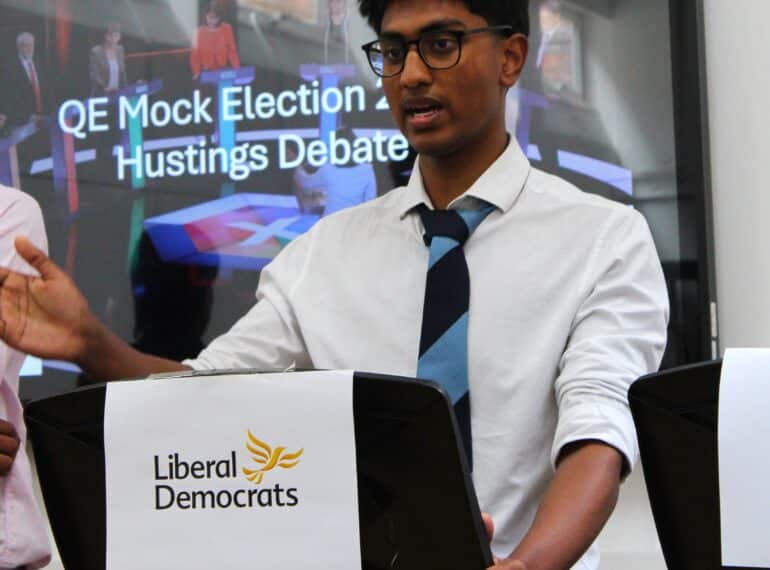
 In the School’s mock election, the Liberal Democrats emerged as easily the biggest party, with 21 of the 46 seats in QE’s parliament.
In the School’s mock election, the Liberal Democrats emerged as easily the biggest party, with 21 of the 46 seats in QE’s parliament. The run-up to the mock election included a hustings, where parties made their pitches and fielded questions from the audience. All the candidates were drawn from Year 12.
The run-up to the mock election included a hustings, where parties made their pitches and fielded questions from the audience. All the candidates were drawn from Year 12. In fact, turnout among Year 7 was easily the highest, at almost 80%. Only small numbers of Year 11 cast votes, having recently completed their GCSEs, while Year 13 have already left (and no postal votes were available). One seat was allocated for each of the 46 forms in the School, excluding forms in Year 13.
In fact, turnout among Year 7 was easily the highest, at almost 80%. Only small numbers of Year 11 cast votes, having recently completed their GCSEs, while Year 13 have already left (and no postal votes were available). One seat was allocated for each of the 46 forms in the School, excluding forms in Year 13.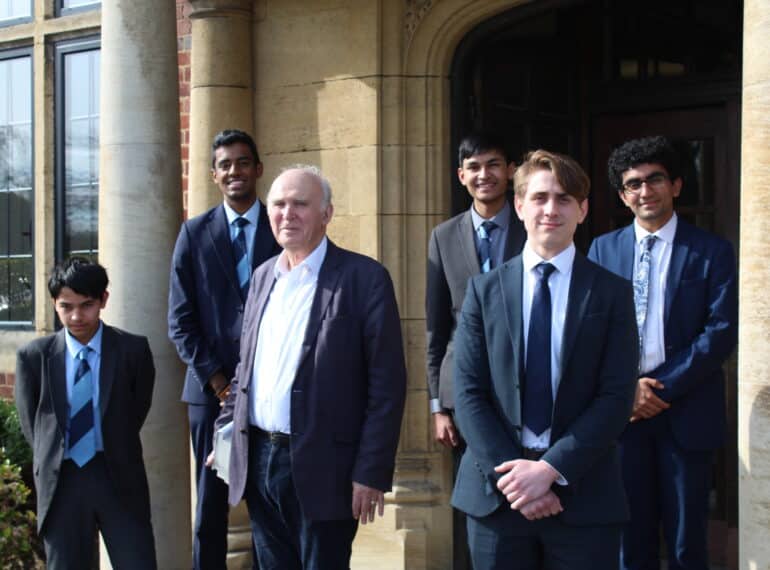
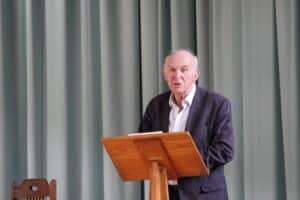 His afternoon visit to QE was led by the society’s Rishabh Bhatt, of Year 12. Before taking questions from an audience drawn from all year groups in the Main School Hall, he gave some brief advice to any aspiring politicians. They should understand the importance of:
His afternoon visit to QE was led by the society’s Rishabh Bhatt, of Year 12. Before taking questions from an audience drawn from all year groups in the Main School Hall, he gave some brief advice to any aspiring politicians. They should understand the importance of: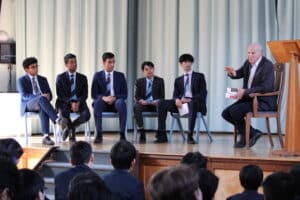 Assessing how the General Election may go overall, he said that a Labour government seems the most likely at present, but that it was entirely possible that it would not have the big majority that some, taking their cue from opinion polls, are assuming.
Assessing how the General Election may go overall, he said that a Labour government seems the most likely at present, but that it was entirely possible that it would not have the big majority that some, taking their cue from opinion polls, are assuming.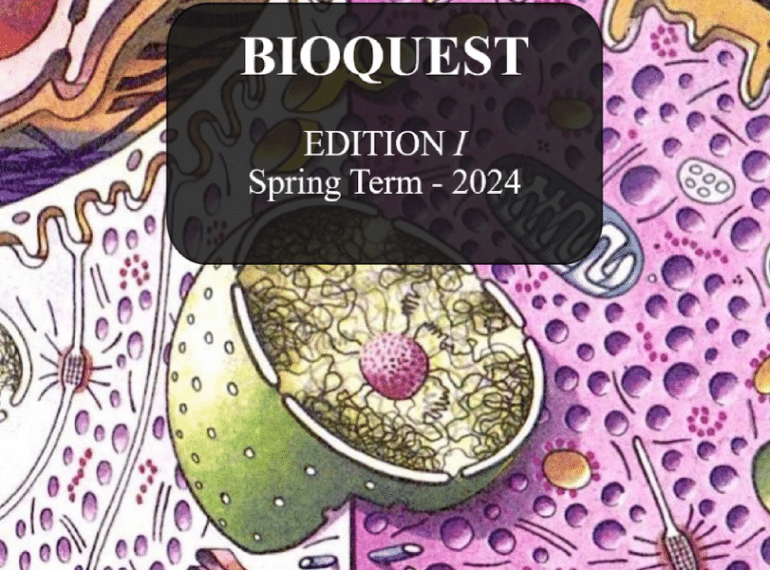
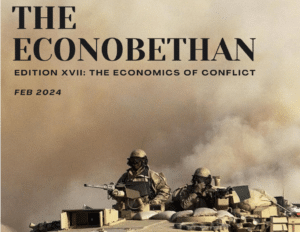 The first edition is contained within the pages of The Econobethan, the School’s well-established Economics and Politics magazine, but future editions are intended to be stand-alone publications.
The first edition is contained within the pages of The Econobethan, the School’s well-established Economics and Politics magazine, but future editions are intended to be stand-alone publications. Seyed Jalili considers how the identification of CHIP (Clonal Hematopoiesis of Indeterminate Potential) in human blood cells might translate into effective treatments. Joshua John looks at the ethical implications of genetic screening in his piece entitled The Cost of a Human Life.
Seyed Jalili considers how the identification of CHIP (Clonal Hematopoiesis of Indeterminate Potential) in human blood cells might translate into effective treatments. Joshua John looks at the ethical implications of genetic screening in his piece entitled The Cost of a Human Life.
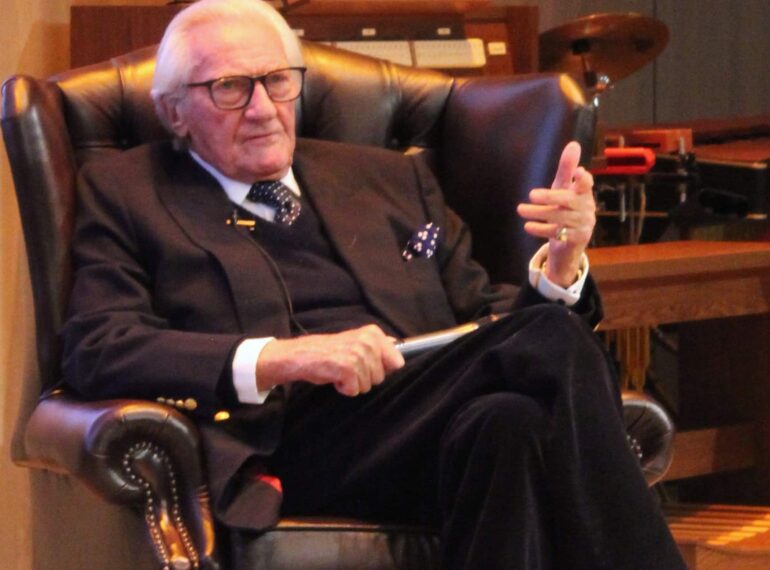
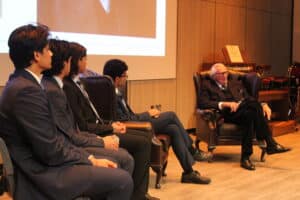 The Conservative politician, who worked directly with four Prime Ministers, spoke to a packed house drawn from all year groups in the Friends’ Recital Hall. The optional lecture, part of QE’s Flourish extra-curricular programme, was organised by Year 13 pupil Anish Kumar and the QE Politics Society.
The Conservative politician, who worked directly with four Prime Ministers, spoke to a packed house drawn from all year groups in the Friends’ Recital Hall. The optional lecture, part of QE’s Flourish extra-curricular programme, was organised by Year 13 pupil Anish Kumar and the QE Politics Society.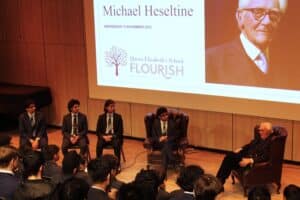 Lord Heseltine, who is 90, began his career as a property developer, before becoming one of the founders of the Haymarket publishing house. He served as a Conservative Member of Parliament from 1966 to 2001, when he was created a life peer.
Lord Heseltine, who is 90, began his career as a property developer, before becoming one of the founders of the Haymarket publishing house. He served as a Conservative Member of Parliament from 1966 to 2001, when he was created a life peer.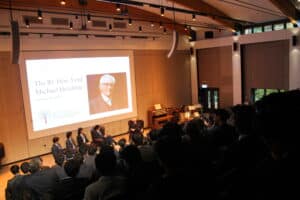 In his lecture, he covered topics ranging from industrial strategy (a particular interest and area of expertise of his) and the revitalisation of the city of Liverpool (with which he has a special, and perhaps unique, relationship as a Conservative politician), to devolution. Famously a supporter of the European Union and opponent of Eurosceptics, he expressed his desire to see the UK return to the EU fold in the future.
In his lecture, he covered topics ranging from industrial strategy (a particular interest and area of expertise of his) and the revitalisation of the city of Liverpool (with which he has a special, and perhaps unique, relationship as a Conservative politician), to devolution. Famously a supporter of the European Union and opponent of Eurosceptics, he expressed his desire to see the UK return to the EU fold in the future.